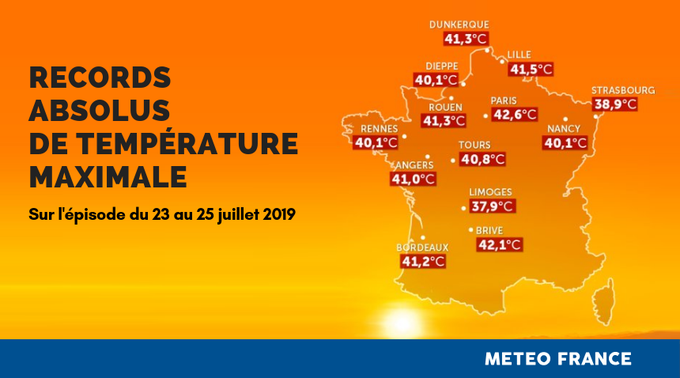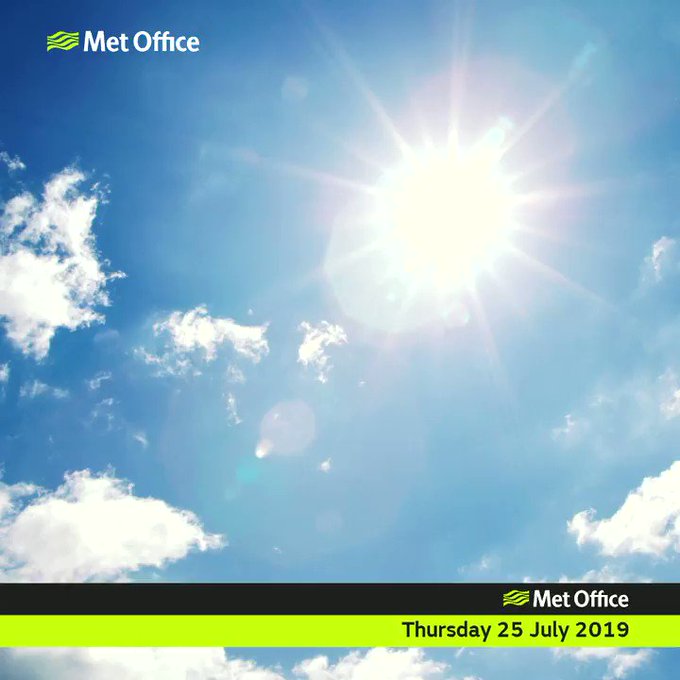People cool off in and around a large water pool at Trocadero, across the Seine from the Eiffel Tower on July 25 in Paris, France. Owen Franken / Corbis / Getty Images
Europe's second extreme heat wave of the summer has lived up to predictions, smashing records across the continent.
Paris recorded its all-time highest temperature of 42.6 degrees Celsius, BBC News reported. Belgium, Germany, and the Netherlands all endured record highs on Wednesday only to see them broken again on Thursday, AccuWeather reported. Thursday's all-time highs measured 41.8 for Belgium, 42.6 for Germany and 40.7 for the Netherlands, the first time the country heated to 40 degrees or more.
The UK, meanwhile, experienced its hottest ever July temperature of 38.1 degrees Celsius, BBC News reported. This is only the second time that the UK has experienced a temperature above 100 degrees Fahrenheit, the UK's Met Office tweeted.
The heat has proven potentially deadly, as five deaths recorded in France may have been linked to the heat. It also interfered with transportation. Trains in Britain ran at reduced speeds to keep rails from buckling, and a Eurostar traveling from Belgium to London actually broke down Wednesday, forcing passengers to wait in the heat for three hours.
"Everything was suddenly down: no air-conditioning, no electricity," passenger Paul De Grauwe said, as The New York Times reported. "I have never been so hot in my life."
The high Paris temperatures also threatened Notre-Dame cathedral, which was damaged in a fire in April.
"I am very worried about the heat wave because, as you know, the cathedral suffered from the fire, the beams coming down, but also the shock from the water from the firefighters. The masonry is saturated with water," Chief Architect Philippe Villeneuve told Reuters, as AccuWeather reported.
The Met Office noted that heat waves in Europe have gotten both more likely and more extreme because of the climate crisis, BBC News reported.
"What we have at the moment is this very warm stream of air, coming up from northern Africa, bringing with it unusually warm weather," the Met Office's Dr. Peter Stott told BBC 5Live. "But without climate change we wouldn't have hit the peaks that we're hitting right now."
Other scientists agreed.
"This. Is. Climate. Change." University of Oxford climate scientist Karsten Haustein tweeted.
Heat waves like this week's cause increased discomfort for Europeans because the continent has not embraced air conditioning as the U.S has. While more than 90 percent of U.S. homes have an air-conditioning system, fewer than 10 percent of European homes do, The New York Times reported.
That may change with more frequent heat waves. The head of a Munich-based air-conditioning installation company said he had seen steady growth from year to year. But more units would also mean more climate change.
"By cooling off the inside and warming the outside, we are feeding a disastrous vicious circle," Brice Tréméac, the head of Paris-based research institution the Laboratory of Cold, Energy and Thermic Systems, told The New York Times.
For now, however, Europe can expect to see some relief Friday as temperatures cool. But the warm air could wreak further havoc as it moves towards Greenland, where it could cause record melting of its ice-sheet, Reuters reported Friday.
"According to forecasts, and this is of concern, the atmospheric flow is now going to transport that heat towards Greenland," World Meteorological Organization spokeswoman Clare Nullis said in a UN briefing in Geneva Friday. "This will result in high temperatures and consequently enhanced melting of the Greenland ice sheet. We don't know yet whether it will beat the 2012 level, but it's close."
So far this July, the ice sheet has lost the equivalent of 64 million Olympic-sized swimming pools worth of ice through surface melting. The hot weather could also further melt Arctic sea ice, which was close to its lowest extent on record as of July 15.
https://www.ecowatch.com/second-major-heat-wave-europe-2639356572.html
Paris recorded its all-time highest temperature of 42.6 degrees Celsius, BBC News reported. Belgium, Germany, and the Netherlands all endured record highs on Wednesday only to see them broken again on Thursday, AccuWeather reported. Thursday's all-time highs measured 41.8 for Belgium, 42.6 for Germany and 40.7 for the Netherlands, the first time the country heated to 40 degrees or more.
The European #heatwave smashed numerous temperature records in #France, #Belgium, #Germany, #Netherlands. This included 42.6°C in Paris and 41.5°C in Lille, according to @meteofrance .
71 people are talking about this
The UK, meanwhile, experienced its hottest ever July temperature of 38.1 degrees Celsius, BBC News reported. This is only the second time that the UK has experienced a temperature above 100 degrees Fahrenheit, the UK's Met Office tweeted.
38.1 °C has been recorded at Cambridge; this is only the second time temperatures over 100 Fahrenheit have been recorded in the UK #heatwave #HottestUKJulyDay #HottestDayOfTheYear so far
1,152 people are talking about this
The heat has proven potentially deadly, as five deaths recorded in France may have been linked to the heat. It also interfered with transportation. Trains in Britain ran at reduced speeds to keep rails from buckling, and a Eurostar traveling from Belgium to London actually broke down Wednesday, forcing passengers to wait in the heat for three hours.
"Everything was suddenly down: no air-conditioning, no electricity," passenger Paul De Grauwe said, as The New York Times reported. "I have never been so hot in my life."
The high Paris temperatures also threatened Notre-Dame cathedral, which was damaged in a fire in April.
"I am very worried about the heat wave because, as you know, the cathedral suffered from the fire, the beams coming down, but also the shock from the water from the firefighters. The masonry is saturated with water," Chief Architect Philippe Villeneuve told Reuters, as AccuWeather reported.
The Met Office noted that heat waves in Europe have gotten both more likely and more extreme because of the climate crisis, BBC News reported.
"What we have at the moment is this very warm stream of air, coming up from northern Africa, bringing with it unusually warm weather," the Met Office's Dr. Peter Stott told BBC 5Live. "But without climate change we wouldn't have hit the peaks that we're hitting right now."
Other scientists agreed.
"This. Is. Climate. Change." University of Oxford climate scientist Karsten Haustein tweeted.
This. Is. Climate. Change. #hottestdayonrecord https://twitter.com/mikarantane/status/1154403074762510337 …
290 people are talking about this
Heat waves like this week's cause increased discomfort for Europeans because the continent has not embraced air conditioning as the U.S has. While more than 90 percent of U.S. homes have an air-conditioning system, fewer than 10 percent of European homes do, The New York Times reported.
That may change with more frequent heat waves. The head of a Munich-based air-conditioning installation company said he had seen steady growth from year to year. But more units would also mean more climate change.
"By cooling off the inside and warming the outside, we are feeding a disastrous vicious circle," Brice Tréméac, the head of Paris-based research institution the Laboratory of Cold, Energy and Thermic Systems, told The New York Times.
29 people are talking about this
For now, however, Europe can expect to see some relief Friday as temperatures cool. But the warm air could wreak further havoc as it moves towards Greenland, where it could cause record melting of its ice-sheet, Reuters reported Friday.
"According to forecasts, and this is of concern, the atmospheric flow is now going to transport that heat towards Greenland," World Meteorological Organization spokeswoman Clare Nullis said in a UN briefing in Geneva Friday. "This will result in high temperatures and consequently enhanced melting of the Greenland ice sheet. We don't know yet whether it will beat the 2012 level, but it's close."
So far this July, the ice sheet has lost the equivalent of 64 million Olympic-sized swimming pools worth of ice through surface melting. The hot weather could also further melt Arctic sea ice, which was close to its lowest extent on record as of July 15.
https://www.ecowatch.com/second-major-heat-wave-europe-2639356572.html














